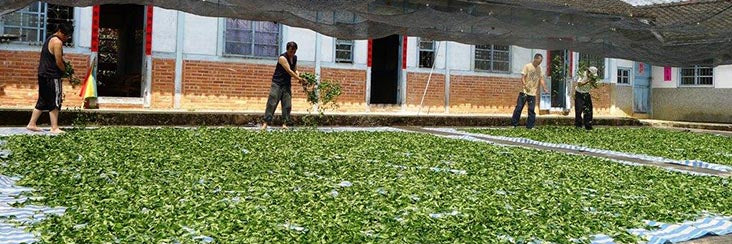
Tea Story #3: Traditional Dong Ding Oolong Tea, Spring 2013
Dong Ding Oolong Tea made in the traditional way is a favorite of ours, and this is a fine example of an extra robust, heavily roasted version of Dong Ding Oolong.
This batch of tea comes from Yong Long Village, just above Dong Ding Mountain, at 750m elevation in Lu Gu Township, Nantou County. It was cultivated and processed by a senior member of the board of tea judges in the Lu Gu Farmers' Association Tea Competition - the largest and most prestigious oolong tea competition in the world.
This ridge above Dong Ding Mountain is home to the neighboring Yong Long and Feng Huang Villages and is known for a rich red soil which differs from other locales in Lu Gu. The unique flavor of Dong Ding Oolong produced here is attributed to this soil quality, along with the fact that these villages are home to the most concentrated population of the most skilled oolong tea artisans in Taiwan.
We feel privileged to have procured this batch of tea, as it was the result of a chance occurrence, where we just happened to be the right place at the right time. It was prepared to be entered into the local competition (limited to residents of the above said villages) for traditionally made Oolong Tea. These two villages are the home and heart of traditional Oolong Tea in Taiwan. However, this year the number of entries were too few to warrant the production of the competition, so it was cancelled. This is testimony to the waning population of traditional Oolong Tea artisans who take pride in their skill and heritage. Hence, this tea - which was meant for competition, was made available for sale.

Competition grade tea is the artisan's choice to represent his best tea of the season. This tea was carefully prepared by hand-removing the stems from the most eligible batch produced from this farmer's spring harvest. The stem removal, along with repeated post-production roasting (a total of 30 hours or more) of the tea leaves is testimony to the labor intensive process of traditional tea making. We are proud to represent this artisan tea from a farmer who we consider to be an exemplary figure in the 21st century tea industry.
Eco-Cha team-member and tea sourcer - Andy, happened to make a spontaneous visit to this home just moments after a substantial earthquake that caused considerable damage in the area. He had known this farmer for many years on a friendly basis but had never procured tea from him. Andy was actually on his way to another farmer’s house, but by taking a wrong turn down one of the small winding streets in this farming village, he pulled into a familiar courtyard of a traditional style home that he hadn’t visited in years. The coincidence of arriving at this home by accident, immediately following a major quake, and being served a tea that was prepared for a local competition that did not take place was indeed serendipitous. Our friendship with this farmer has grown through this event, and Andy has greatly appreciated his discussions on current trends in the local tea industry on the visits that have followed since, as the artisan jokingly commented, “the earthquake knocked him into their home”.

This farm consists of tea trees planted 11 years ago, after the farm was left fallow for several years followed by turning the earth over a meter deep and mixing it with crushed seashells and natural compost to balance the ph and re-nutrify the soil. It is now a visibly healthy and flourishing grove of tea that is cultivated without the use of chemical weed killers or fertilizers, and only minimal water soluble pesticides that are approved by the Taiwan government subsidized Tea Research Extension Station (TRES). The soil was inspected many years ago and the harvested leaves are tested annually. The proprietor of this farm is committed to keeping his family heritage alive as artisan tea makers by acknowledging the lessons learned by his father and being more responsible in his farming methods. The tea leaves are processed in their own factory at home - a traditional 3-sided farmhouse that is just a few minutes stroll away from their tea garden.


